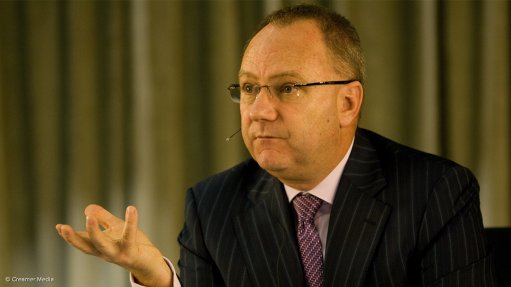
Mark Cutifani
Photo by: Duane Daws
In a hard-hitting address, Anglo American CEO Mark Cutifani lamented the decline in the competitiveness of South Africa's mining industry and warned that the “trust deficit” between government, the industry and labour would need to be urgently overcome if the country and the sector were to navigate the current difficulties brought about by falling commodity prices, rising costs and low productivity.
“We have to survive these tough times together,” the Australian-born mining leader, who spent six years in senior executive positions in South Africa, told an audience at the Gordon Institute of Business Science in Johannesburg on Thursday night.
He warned, however, that job losses were inevitable. And in a direct response to African National Congress secretary-general Gwede Mantashe’s assertions that the current retrenchment plans in the mining sector represented “lazy” thinking by management, Cutifani asserted that Anglo had explored “all avenues” before announcing its restructuring plans.
The diversified mining group announced recently that it would cut its global headcount by 53 000 people, or around 35% of its workforce, with thousands of jobs likely to be affected in South Africa where Anglo had large coal, iron-ore, platinum and diamond operations. Cutifani stressed, though, that 85% of the reduction in employees would arise as a result of the sale of assets rather than direct retrenchments.
Despite South Africa’s large mineral endowments, the country was “underperforming” relative to its global peers and had slumped to fall outside the top 50 most attractive mining jurisdictions globally.
Cutifani described the decline – which he attributed to regulatory and ownership uncertainty, adversarial labour relations and a failure of State-owned companies to provide the basic services required to sustain mining – as “unacceptable” and said that South Africa ought to be a “top ten” destination in light of its “natural and created advantages”.
He warned that South Africa was already losing out on its fair share of “discretionary capital”, owing to the poor performance of the domestic industry and that there was now even a risk that ‘stay-in-business capital’ could be reduced.
For Anglo, sustaining capital represented 60% to 70% of its yearly investment and a reduction would reduce mine life and place even more jobs at risk. “Not tomorrow, maybe not even in five years, but in ten years we will be having a very ugly conversation”.
The domestic industry currently employed about 500 000 people directly and 800 000 indirectly, and accounted for 18% of gross domestic product and 60% of exports.
“If mining here had come to the party with a growth rate matching the rest of the economy over the past 20 years, we would have seen annual average growth over that period rising 3.2% to about 4% – a significant 25% improvement on what has been achieved. And there could have been some 20% more jobs – equivalent to 260 000 direct and indirect positions.”
Cutifani was buoyed by government’s decision to extend the Operation Phakisa intervention to the mining sector and indicated that he would personally be an “enthusiastic participant in the Phakisa Mining Lab”, which Cabinet had announced would convene over a four-week period in October.
In a statement, Cabinet said the initiative would identify a set of concrete problems that were limiting the growth and developmental impact of the sector and that plans would be developed “collaboratively” to overcome the problems.
Anglo would be making a series of proposals to government and labour, including a fundamental overhaul of “outdated” working arrangements, which Cutifani believed would lift productivity and bolster the long-term sustainability of the sector.
But the group would also use the process to appeal to government to:
- Improve policy and regulatory certainty, while recognising that stability was a requirement for mining investment, which was long-term in nature.
- Provide greater clarity on broad-based black economic-empowerment ownership.
- Create and maintain supporting energy, transport and water infrastructure.
- Develop a level playing field for all industry participants.
- Consider the implication of declaring certain minerals ‘strategic’.
- Apply commercial logic to the beneficiation of mineral products.
- Consider the industry competitiveness when making changes to mining legislation.
- And honour commitments to near-mine communities by delivering basic services.
Cutifani also indicated that, while Anglo had supported the Chamber of Mines’ role as an applicant to the courts to make a determination on the contentious issue of whether miners were “once empowered always empowered”, the group would rather pursue talks with government on the matter.
He said he was hoping that such a conversation would make the declaratory order currently being sought “redundant”.
“Don’t let the courts, or a single judge, decide the future of this country; that’s not their role,” he said, describing the current legal process as a “second-best mechanism, not the best”.